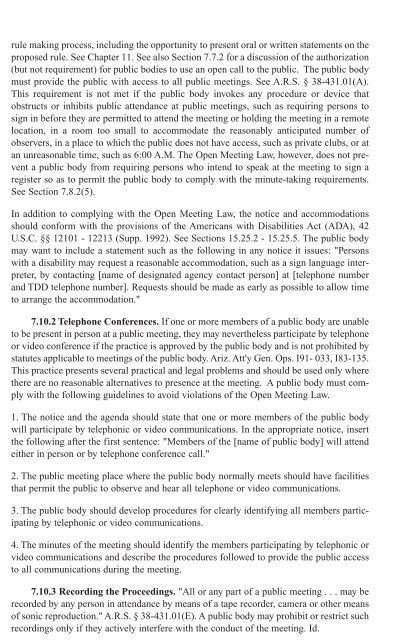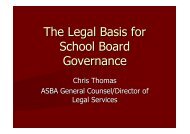The Arizona Open Meeting Law - Arizona School Boards Association
The Arizona Open Meeting Law - Arizona School Boards Association
The Arizona Open Meeting Law - Arizona School Boards Association
Create successful ePaper yourself
Turn your PDF publications into a flip-book with our unique Google optimized e-Paper software.
ule making process, including the opportunity to present oral or written statements on the<br />
proposed rule. See Chapter 11. See also Section 7.7.2 for a discussion of the authorization<br />
(but not requirement) for public bodies to use an open call to the public. <strong>The</strong> public body<br />
must provide the public with access to all public meetings. See A.R.S. § 38-431.01(A).<br />
This requirement is not met if the public body invokes any procedure or device that<br />
obstructs or inhibits public attendance at public meetings, such as requiring persons to<br />
sign in before they are permitted to attend the meeting or holding the meeting in a remote<br />
location, in a room too small to accommodate the reasonably anticipated number of<br />
observers, in a place to which the public does not have access, such as private clubs, or at<br />
an unreasonable time, such as 6:00 A.M. <strong>The</strong> <strong>Open</strong> <strong>Meeting</strong> <strong>Law</strong>, however, does not prevent<br />
a public body from requiring persons who intend to speak at the meeting to sign a<br />
register so as to permit the public body to comply with the minute-taking requirements.<br />
See Section 7.8.2(5).<br />
In addition to complying with the <strong>Open</strong> <strong>Meeting</strong> <strong>Law</strong>, the notice and accommodations<br />
should conform with the provisions of the Americans with Disabilities Act (ADA), 42<br />
U.S.C. §§ 12101 - 12213 (Supp. 1992). See Sections 15.25.2 - 15.25.5. <strong>The</strong> public body<br />
may want to include a statement such as the following in any notice it issues: "Persons<br />
with a disability may request a reasonable accommodation, such as a sign language interpreter,<br />
by contacting [name of designated agency contact person] at [telephone number<br />
and TDD telephone number]. Requests should be made as early as possible to allow time<br />
to arrange the accommodation."<br />
7.10.2 Telephone Conferences. If one or more members of a public body are unable<br />
to be present in person at a public meeting, they may nevertheless participate by telephone<br />
or video conference if the practice is approved by the public body and is not prohibited by<br />
statutes applicable to meetings of the public body. Ariz. Att'y Gen. Ops. I91- 033, I83-135.<br />
This practice presents several practical and legal problems and should be used only where<br />
there are no reasonable alternatives to presence at the meeting. A public body must comply<br />
with the following guidelines to avoid violations of the <strong>Open</strong> <strong>Meeting</strong> <strong>Law</strong>.<br />
1. <strong>The</strong> notice and the agenda should state that one or more members of the public body<br />
will participate by telephonic or video communications. In the appropriate notice, insert<br />
the following after the first sentence: "Members of the [name of public body] will attend<br />
either in person or by telephone conference call."<br />
2. <strong>The</strong> public meeting place where the public body normally meets should have facilities<br />
that permit the public to observe and hear all telephone or video communications.<br />
3. <strong>The</strong> public body should develop procedures for clearly identifying all members participating<br />
by telephonic or video communications.<br />
4. <strong>The</strong> minutes of the meeting should identify the members participating by telephonic or<br />
video communications and describe the procedures followed to provide the public access<br />
to all communications during the meeting.<br />
7.10.3 Recording the Proceedings. "All or any part of a public meeting . . . may be<br />
recorded by any person in attendance by means of a tape recorder, camera or other means<br />
of sonic reproduction." A.R.S. § 38-431.01(E). A public body may prohibit or restrict such<br />
recordings only if they actively interfere with the conduct of the meeting. Id.<br />
- 37 -



